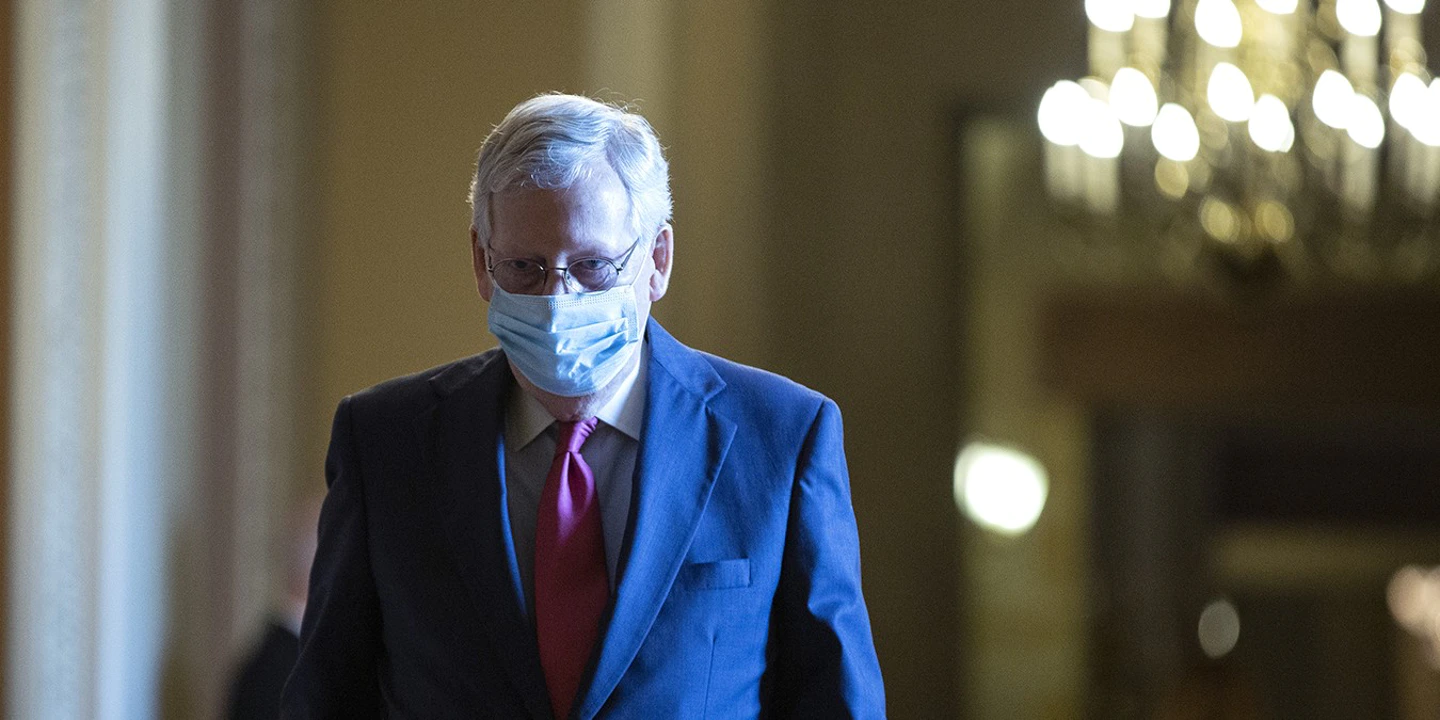Corporate Immunity, Mitch McConnell's Priority for Coronavirus Relief, Is a Longtime Focus of the Conservative Right
-
Senate Majority Leader Mitch McConnell walks to the Senate Floor at the U.S. Capitol in Washington, D.C., on May 19, 2020.
[Image source. Click image to open in new window.]
Senate Republicans' top priority for the next coronavirus relief bill, which would protect employers that face lawsuits if their workers get sick or die of COVID-19 -- the disease caused by the novel coronavirus -- on the job, is the culmination of a decade-old effort by conservative groups like the American Legislative Exchange Council, or ALEC.
Republican Senate Majority Leader Mitch McConnell has been focused on corporate immunity for weeks, warning that looming lawsuits related to the coronavirus could crush the nation's recovery efforts going forward. Republican proposals would limit liability for certain eligible companies that have resumed in-person operations, provided that businesses follow existing safety and health guidelines specific to COVID-19. In remarks on the Senate floor earlier this month, McConnell thanked fellow Republican Sen. John Cornyn of Texas for "thinking proactively about the issue of legal liability."
ALEC, a Koch-backed nonprofit that drafts model bills for state legislators, has pushed similar corporate immunity measures on the state level since the early 2000s, part of a broader Republican push to overhaul tort law. At least 10 states have adopted such measures. In the wake of the pandemic, the group is now adapting existing model bills to limit liability in cases specifically related to the coronavirus, Bloomberg reported. In Utah and North Carolina -- where ALEC's past chair is the state House's chair of appropriations -- lawmakers this month passed new business liability protections giving immunity to businesses, property owners, health care providers, and other essential businesses operating during the pandemic.
Business groups in North Carolina, including the state chamber of commerce, had opposed an earlier bipartisan bill to strengthen protections for workers and companies handling workers' compensation clauses related to the coronavirus, according to Democratic state Rep. Graig Meyer. Under that bill, employers could rebut claims, "but we would give the benefit of the doubt to the worker, not the employer," Meyer said. At least 25 business groups in the state, including the state chamber of commerce -- which lists reforming tort and liability law as a top legislative priority this cycle -- put out a statement opposing the measure earlier this month. The state chamber had previously sent an April 29 letter to members of the state House outlining its priorities, including "limiting coronavirus liability concerns."
The U.S. Chamber of Commerce has also been pushing such legislation on the federal level. In a mid-April memo to members, the group said legal action from workers exposed to COVID-19 was "perhaps the largest area of concern for the overall business community," Roll Call reported, adding, "Businesses say they keep their workplaces safe, but the memo indicates that major corporations privately acknowledge that many so-called essential employees will get sick or die."
Republicans have said they won't support the next relief bill if it doesn't include corporate immunity, while Democrats, despite being critical, have not ruled out supporting it. On a press call in late April, Democratic Senate Minority Leader Chuck Schumer said McConnell was protecting corporate executives and "wants to make it harder for workers to show up at their jobs and to hold their employers accountable for providing safe working conditions."
Asked if she was open to McConnell's push for corporate liability protections, House Speaker Nancy Pelosi said "we have no red lines" but that the "best protection for our workers and for their employers is to follow very good OSHA mandatory guidelines. And we have that in our bill," referring to elements from the Workers Bill of Rights led by Massachusetts Sen. Elizabeth Warren and California Rep. Ro Khanna related to hazard pay and personal protective equipment. The speaker "did not dismiss the possibility that liability protections would be part of a bipartisan package," CBS reported.
The CARES Act, as well as the HEROES Act, the relief bill passed by House Democrats on May 15 2020, have included corporate bailouts and special operating privileges for health insurance, lobbying, defense, and financial industries, as well as a millionaire tax break that several Democrats did not even realize was in the legislation. Progressives have faced criticism, including from The Intercept, for waving those bills through.
Responding to that criticism, Khanna said progressives are limited in their ability to influence legislation because CPC leadership is not in the negotiating room with party leaders, adding that the caucus needed to build better relationships with leaders and committee chairs. "The challenge is that, the progressives can't vote down bills that are gonna put money in the pockets of working families, but they get all of these negative things attached to them," Khanna said, adding that the caucus is negotiating for priorities like immediate cash payments and proposals for Medicare for All in the next phase of relief. "The only thing I can think of is to have negotiators who are in the room -- that could make a difference," he said. "It's tough without seeing the bill. It's tough without having one of our own in these negotiating conversations."
Return to Persagen.com
